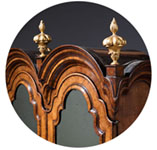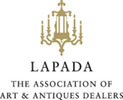18th Century George II Scarlet/Red Japanned Corner Cupboard, Att. Giles Grendey
Request Price Information
Follow Us
18th Century George II Scarlet/Red Japanned Corner Cupboard, Att. Giles Grendey
A fine and rare early 18th century George II scarlet japanned chinoiserie wall hanging corner cupboard. C. 1730-1740.
Attributed to Giles Grendey.
Decorated overall with elaborate Chinoiserie figures and foliage, the moulded cornice above a pair of doors and moulded base, opens to an interior of three shelves. The engraved strap hinges and escutcheon are original.
The chinoiserie decoration of the present piece relates closely to numerous pieces attributed to Giles Grendey and labelled Giles Grendey.
The first is a George II scarlet and gilt-japanned secretaire cabinet, attributed to Giles Grendey. Metropolitan Museum of Art, New York. Accession Number: 2014.186a, b
A George II scarlet and gilt-japanned card table labelled Giles Grendey, circa 1735-1740. Supplied to the Duke of Infantado, Castle of Lazcano near San Sebastian, Spain. Metropolitan Museum of Art, New York. Accession Number: 37.114
A George II scarlet japanned chair labelled Giles Grendey. Supplied to the Duke of Infantado, castle of Lazcano near San Sebastian, Spain. Accession Number: 37.115
And a kneehole desk formerly with Thomas Coulbourn attributed to Giles Grendey. The kneehole was supplied to the Marqueses de Superunda for the Palacio de La Guardia en Álava, and thence by descent.
Giles Grendey was born at Wotton-under-Edge in Gloucestershire in 1693. His workshop was at Aylesbury House, St. John’s Square, Clerkenwell, London and is most famously known to have supplied an order of scarlet japanned furniture to the duke of Infantado for his castle of Lazcano in Spain.
It should be noted that the chinoiserie decoration is in superb original condition and the piece retains its original escutcheon lock and engraved strap hinges.
Condition
Good. Wear consistent with age and use. Superb original condition and of good vibrant colour. Conserved.
Dimensions
Height: 41.34 in. (105 cm)
Width: 27.96 in. (71 cm)
Depth: 18.51 in. (47 cm)
PREVIOUSLY SOLD
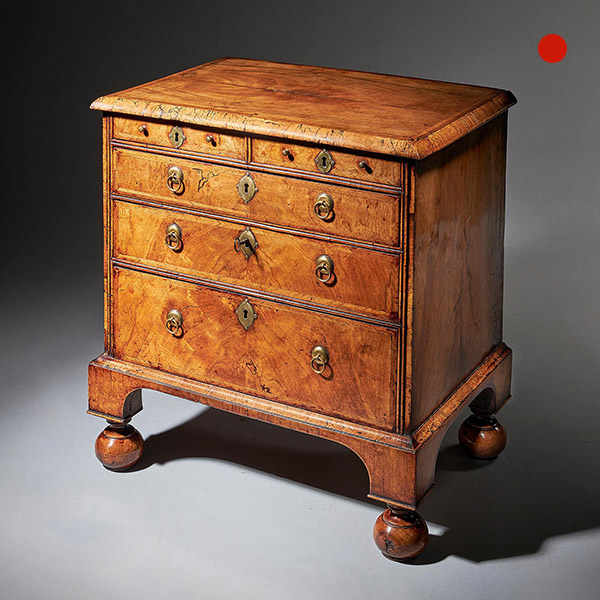
An extremely rare George I walnut chest of small proportions on ball and bracket
An extremely rare George I walnut chest of small proportions on ball and bracket SOLD Follow UsAn extremely rare George I walnut chest of small proportions on ball and bracket The cross-grain moulded and feather banded book-matched top sits...
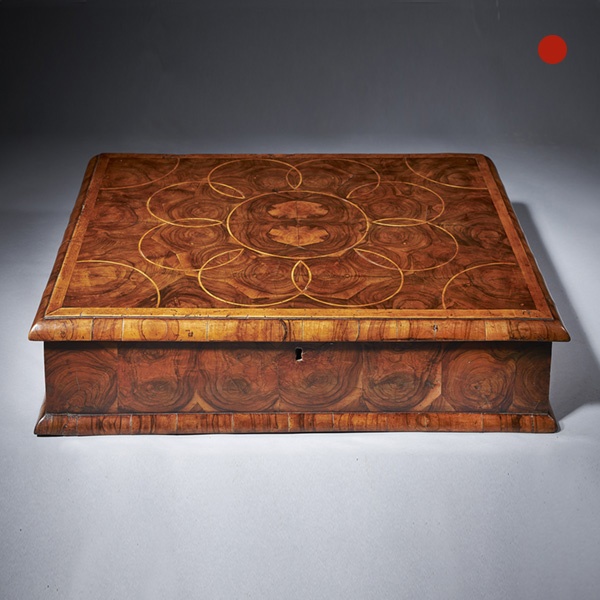
Fine and Rare Late 17th Century William and Mary Olive Oyster Lace Box
Fine and Rare Late 17th Century William and Mary Olive Oyster Lace Box Sold Follow UsFine and Rare Late 17th Century William and Mary Olive Oyster Lace Box A fine and rare late 17th century olive oyster 'lace box from the reign of King...
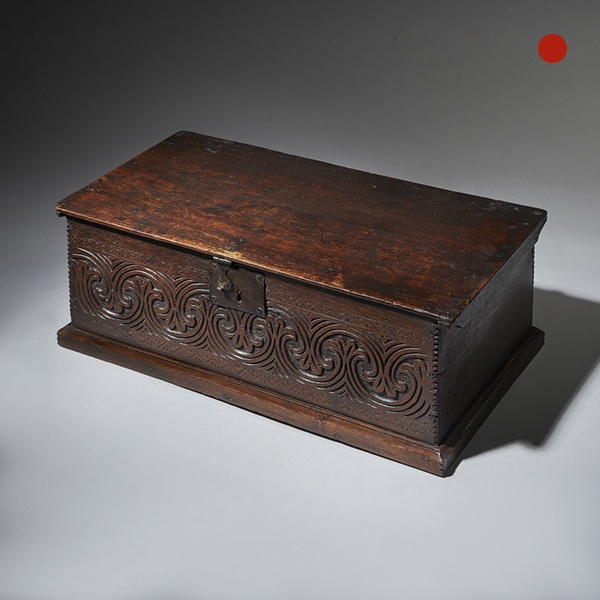
Late 17th Century Charles II Carved Oak Bible Box, Deed Box, Blanket Box,or Candle Box
Late 17th Century Charles II Carved Oak Bible Bo, Deed, Blanket, or Candle Box Sold Follow UsLate 17th Century Charles II Carved Oak Bible, Deed, Blanket, or Candle Box A superb and original late 17th century oak box with excellent and deep...
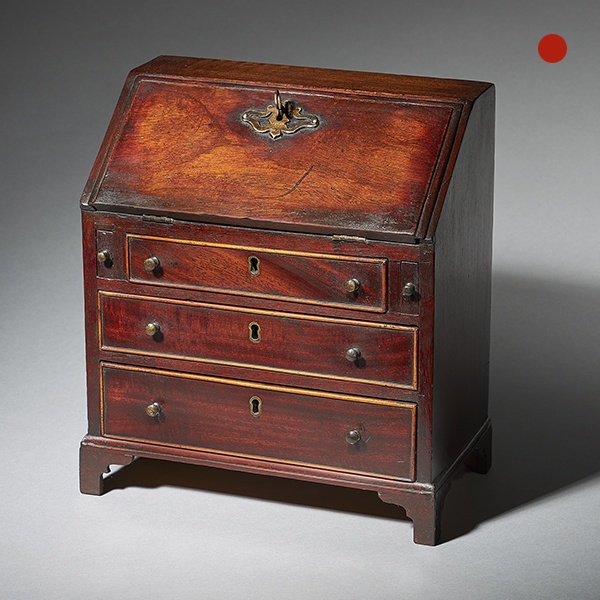
18th Century George II Mahogany Miniature Bureau
18th Century George II Mahogany Miniature Bureau SOLD Follow Us18th Century George II Mahogany Miniature Bureau What came first.... the miniature or the full scale? This small scale model at just 9” wide dates from the very beginning of the...
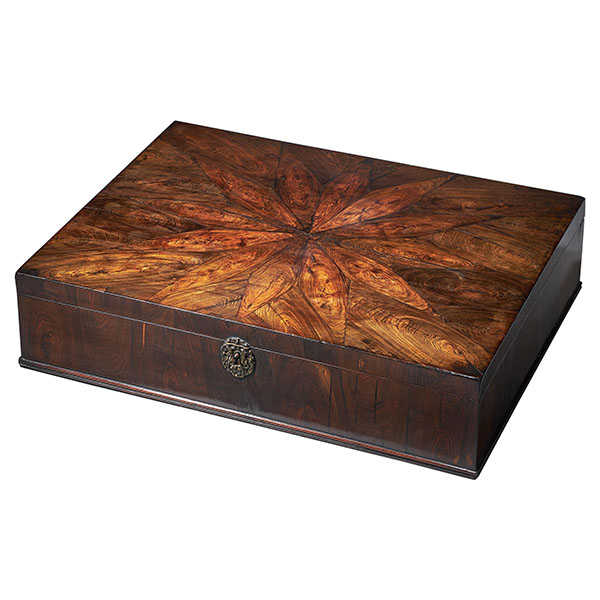
17th Century Charles II Cocuswood Lace Box, Circa 1660, England
17th Century Charles II Cocuswood Lace Box, Circa 1660, England SoldFollow Us17th Century Charles II Cocuswood Lace Box, Circa 1660, England An extremely rare and important Cocuswood oyster (Brya ebenus) lace box from the reign of Charles II,...
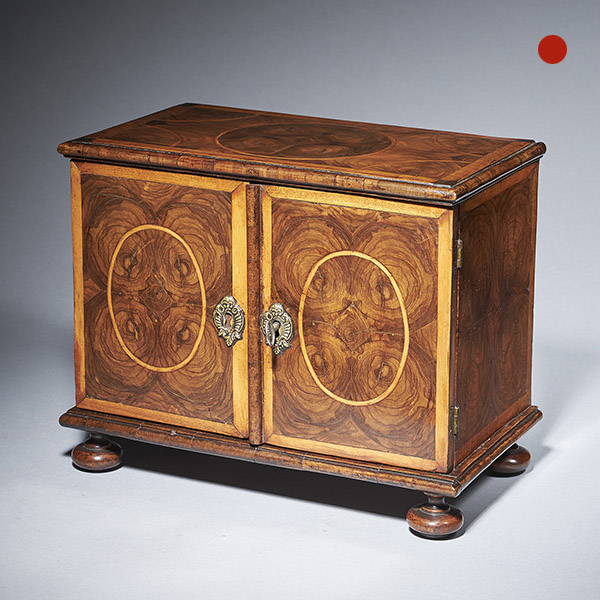
17th-Century miniature table cabinet
The miniature table cabinet opens to an arrangement of drawers, a row of four, a bank of four and a long pen drawer, similarly veneered in oysters of olive.

An extremely rare George I walnut chest of small proportions on ball and bracket
An extremely rare George I walnut chest of small proportions on ball and bracket SOLD Follow UsAn extremely rare George I walnut chest of small proportions on ball and bracket The cross-grain moulded and feather banded book-matched top sits...

Fine and Rare Late 17th Century William and Mary Olive Oyster Lace Box
Fine and Rare Late 17th Century William and Mary Olive Oyster Lace Box Sold Follow UsFine and Rare Late 17th Century William and Mary Olive Oyster Lace Box A fine and rare late 17th century olive oyster 'lace box from the reign of King...

Late 17th Century Charles II Carved Oak Bible Box, Deed Box, Blanket Box,or Candle Box
Late 17th Century Charles II Carved Oak Bible Bo, Deed, Blanket, or Candle Box Sold Follow UsLate 17th Century Charles II Carved Oak Bible, Deed, Blanket, or Candle Box A superb and original late 17th century oak box with excellent and deep...

18th Century George II Mahogany Miniature Bureau
18th Century George II Mahogany Miniature Bureau SOLD Follow Us18th Century George II Mahogany Miniature Bureau What came first.... the miniature or the full scale? This small scale model at just 9” wide dates from the very beginning of the...

17th Century Charles II Cocuswood Lace Box, Circa 1660, England
17th Century Charles II Cocuswood Lace Box, Circa 1660, England SoldFollow Us17th Century Charles II Cocuswood Lace Box, Circa 1660, England An extremely rare and important Cocuswood oyster (Brya ebenus) lace box from the reign of Charles II,...

17th-Century miniature table cabinet
The miniature table cabinet opens to an arrangement of drawers, a row of four, a bank of four and a long pen drawer, similarly veneered in oysters of olive.
YOU MAY ALSO LIKE
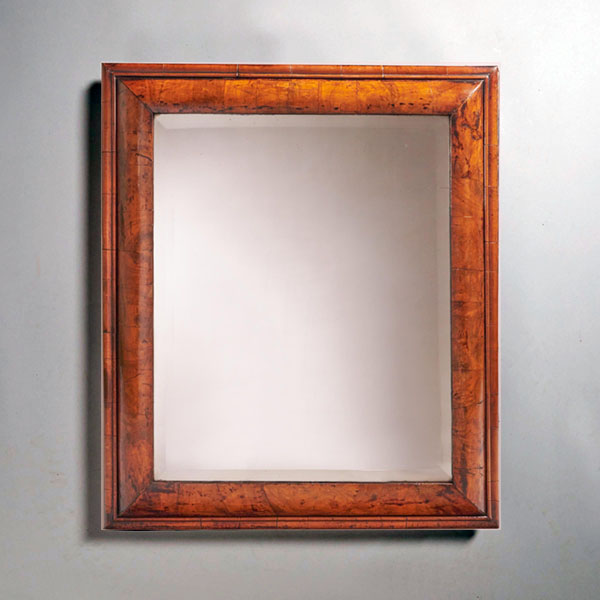
A Fine William and Mary 17th Century Figured Walnut Cushion Mirror C, 1690
A Fine William and Mary 17th Century Figured Walnut Cushion Mirror C, 1690 £6,500Follow UsA Fine William and Mary 17th Century Figured Walnut Cushion Mirror C, 1690 A large William and Mary 17th century figured walnut cushion mirror, circa...
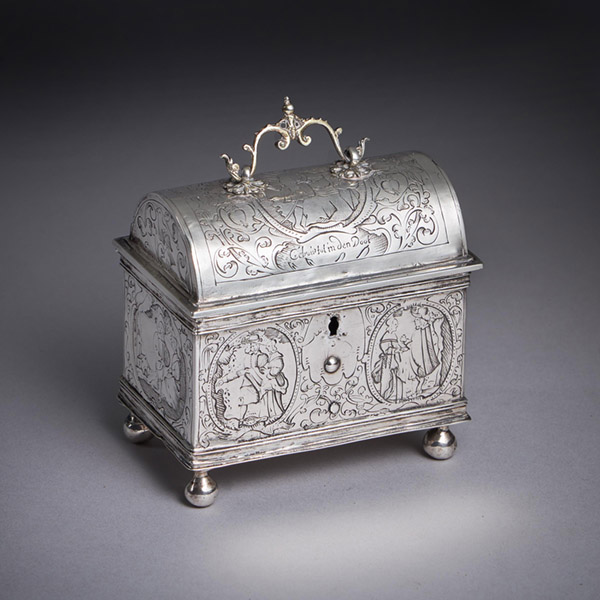
A museum-grade mid-17th century Dutch silver marriage casket or knottekistje, circa 1660
A museum-grade mid-17th century Dutch silver marriage casket or knottekistje, circa 1660 £9,500 [wpforms_selector form_id="11387" show_title="on" _builder_version="4.22.1" _module_preset="default" custom_margin="-30px||||false|false"...
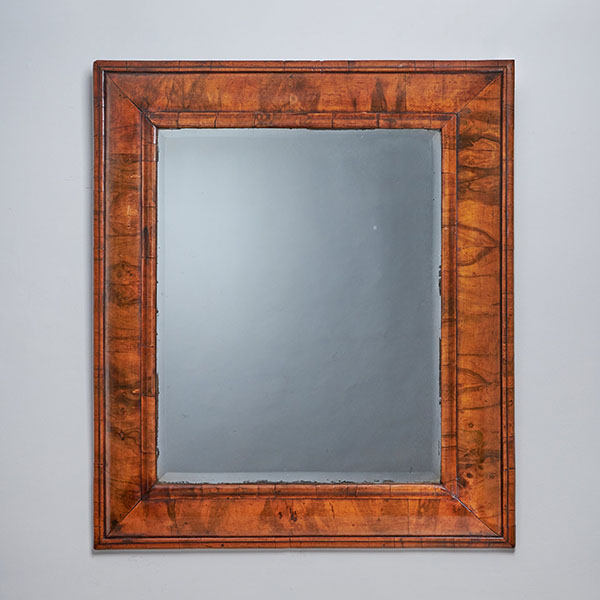
Large William and Mary 17th Century Figured Walnut Cushion Mirror c, 1690
Large William and Mary 17th Century Figured Walnut Cushion Mirror c, 1690 £7,495[wpforms_selector form_id="11387" show_title="on" _builder_version="4.22.1" _module_preset="default" custom_margin="-30px||||false|false" global_colors_info="{}"...
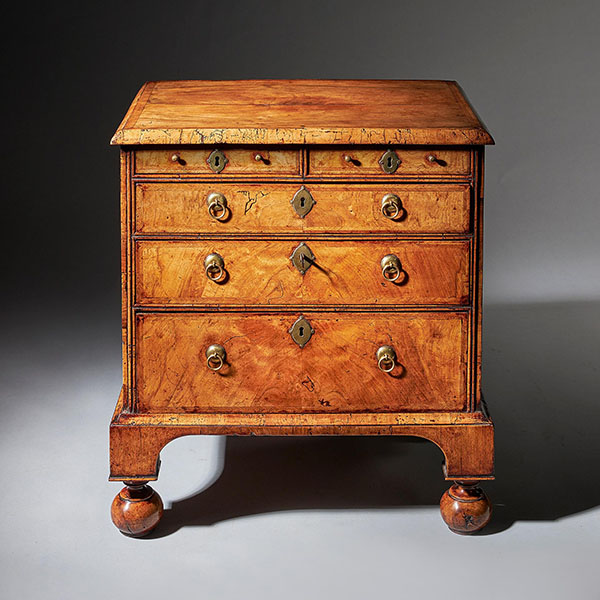
An extremely rare George I walnut chest of small proportions on ball and bracket
An extremely rare George I walnut chest of small proportions on ball and bracket £18,800[wpforms_selector form_id="11387" show_title="on" _builder_version="4.22.1" _module_preset="default" custom_margin="-30px||||false|false"...
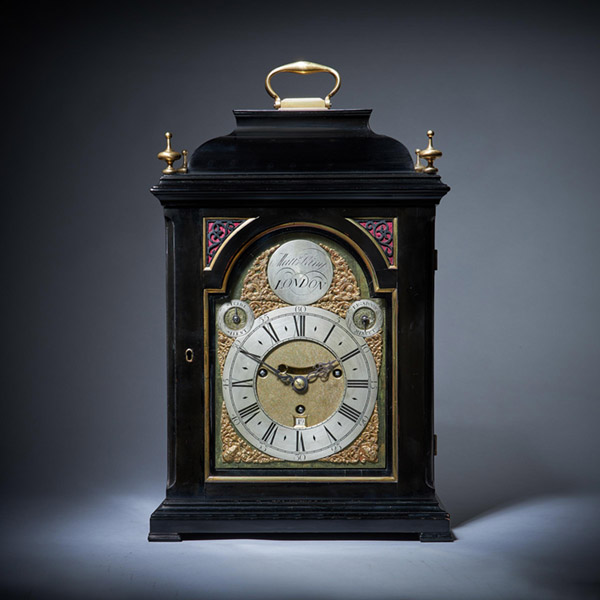
A Rare 18th Century George II Musical Table Clock by Matthew King, c. 1735.
A Rare 18th Century George II Musical Table Clock by Matthew King, c. 1735. £24,500[wpforms_selector form_id="11387" show_title="on" _builder_version="4.22.1" _module_preset="default" custom_margin="-30px||||false|false"...
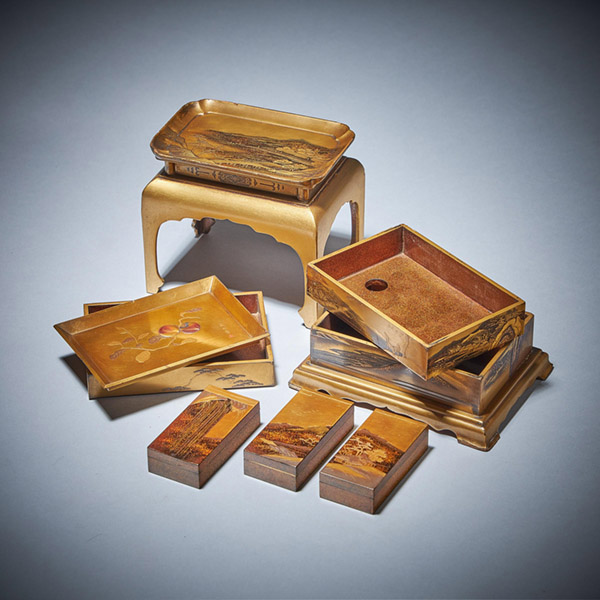
Signed Mid 19th C. Edo/Meiji Period Diminutive Lacquer Stacking Cabinet, Japan
Signed Mid 19th C. Edo/Meiji Period Diminutive Lacquer Stacking Cabinet, Japan £5,800[wpforms_selector form_id="11387" show_title="on" _builder_version="4.22.1" _module_preset="default" custom_margin="-30px||||false|false"...

A Fine William and Mary 17th Century Figured Walnut Cushion Mirror C, 1690
A Fine William and Mary 17th Century Figured Walnut Cushion Mirror C, 1690 £6,500Follow UsA Fine William and Mary 17th Century Figured Walnut Cushion Mirror C, 1690 A large William and Mary 17th century figured walnut cushion mirror, circa...

A museum-grade mid-17th century Dutch silver marriage casket or knottekistje, circa 1660
A museum-grade mid-17th century Dutch silver marriage casket or knottekistje, circa 1660 £9,500 [wpforms_selector form_id="11387" show_title="on" _builder_version="4.22.1" _module_preset="default" custom_margin="-30px||||false|false"...

Large William and Mary 17th Century Figured Walnut Cushion Mirror c, 1690
Large William and Mary 17th Century Figured Walnut Cushion Mirror c, 1690 £7,495[wpforms_selector form_id="11387" show_title="on" _builder_version="4.22.1" _module_preset="default" custom_margin="-30px||||false|false" global_colors_info="{}"...

An extremely rare George I walnut chest of small proportions on ball and bracket
An extremely rare George I walnut chest of small proportions on ball and bracket £18,800[wpforms_selector form_id="11387" show_title="on" _builder_version="4.22.1" _module_preset="default" custom_margin="-30px||||false|false"...

A Rare 18th Century George II Musical Table Clock by Matthew King, c. 1735.
A Rare 18th Century George II Musical Table Clock by Matthew King, c. 1735. £24,500[wpforms_selector form_id="11387" show_title="on" _builder_version="4.22.1" _module_preset="default" custom_margin="-30px||||false|false"...

Signed Mid 19th C. Edo/Meiji Period Diminutive Lacquer Stacking Cabinet, Japan
Signed Mid 19th C. Edo/Meiji Period Diminutive Lacquer Stacking Cabinet, Japan £5,800[wpforms_selector form_id="11387" show_title="on" _builder_version="4.22.1" _module_preset="default" custom_margin="-30px||||false|false"...
